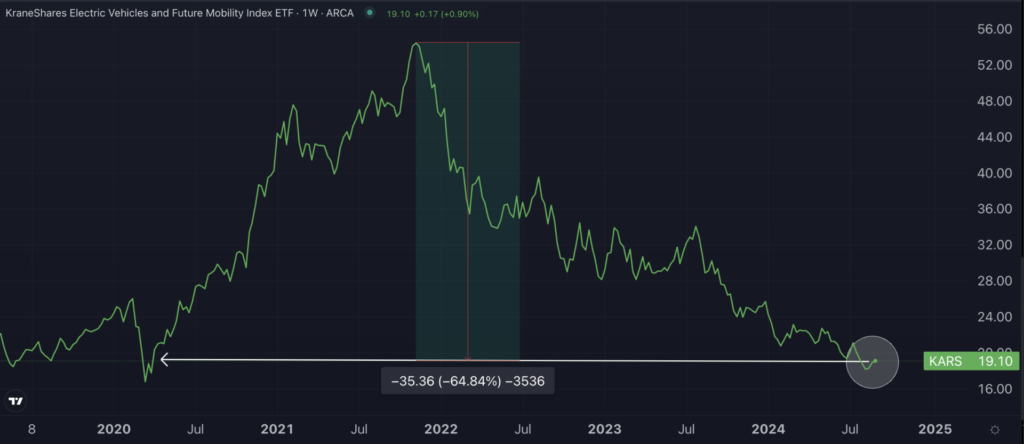Zinger Key Points
- EV sector struggles as demand stalls and competition intensifies, with KARS ETF down nearly 70% from its November 2021 peak.
- Canada imposes 100% tariff on Chinese EV imports, aligning with U.S. and EU, amid escalating trade tensions.
- Feel unsure about the market’s next move? Copy trade alerts from Matt Maley—a Wall Street veteran who consistently finds profits in volatile markets. Claim your 7-day free trial now.
Trade and geopolitical tensions are weighing on the global EV market. On Monday, Reuters reported that Canadian Prime Minister Justin Trudeau announced that Canada would impose a 100% tariff on Chinese electric vehicle imports. In addition, Ottawa will levy a 25% tariff on imported steel and aluminum from China.
These moves align Canada with similar actions taken by the United States and the European Union, following a 30-day public consultation on Chinese EVs and related products.
“We all know that China is not playing by the same rules,” Trudeau said.
The tariffs come as Ottawa seeks to position Canada as a critical player in the global EV supply chain, having already secured multi-billion-dollar deals with top European automakers to strengthen its manufacturing base.
EV Sector Slumps As Demand Falters, Competition Grows
The electric vehicle (EV) sector, once heralded as a driving force for economic growth, is struggling to find its footing as demand stalls and competition intensifies.
The KraneShares Electric Vehicles and Future Mobility Index ETF KARS, tracking 67 EV-related stocks, plunged to its lowest level since March 2020 earlier this month, marking a nearly 70% decline from its peak in November 2021, as reflected in the chart below.

Stalled Demand Pushes Production Shifts
The S&P Global’s Automotive Demand Tracker shows that the volume of electrified vehicle sales in over 150 countries remained stagnant in July 2024 compared to the same month in the previous year.
The most significant drops were recorded in South-East Asia, China, and the Middle East/Africa, with declines of 2.3%, 3.8%, and 6.5%, respectively. Meanwhile, North American demand has remained largely unchanged.
This weakening demand has forced automakers to rethink their production strategies. Last week, Ford Motor Co. F announced it would no longer proceed with plans to build an electric three-row SUV, citing softer-than-expected demand as the key reason for the shift.
Other U.S.-based automakers such as General Motors Co GM and Stellantis NV STLA also scaled back investment ambitions on their EV segments.
Read Also: Ford, GM, Stellantis Cooling To Once-Hot EV Sector As Demand Wanes
Intensified Competition Pressures Profit Margins
As competition in the EV market heats up, automakers are being forced to slash prices to stay competitive.
The International Energy Agency (IEA) highlighted in its latest Global EV Outlook 2024 report that intensifying competition is pushing carmakers to reduce prices to their minimum sustainable profit margins.
Tesla Inc. TSLA, for example, cut the price of its Model Y in the United States from $65,000-$70,000 in mid-2022 to $45,000-$55,000 by early 2024.
In China, local automakers are offering nearly 50 small, affordable electric car models, many priced under CNY 100,000 (approximately $15,000 USD).
Market Reactions
Tesla shares dropped more than 3% on Monday, while Ford, Stellantis, and General Motors saw declines of 1.3%, 0.7%, and 0.4%, respectively.
Among Chinese EV manufacturers, NIO Inc. NIO and Li Auto Inc. LI experienced declines of 1.5% and 1.3%. However, XPeng Inc. XPEV surged 9% after news broke that its CEO had increased his stake in the company.
Read Next:
Photo: Shutterstock
Edge Rankings
Price Trend
© 2025 Benzinga.com. Benzinga does not provide investment advice. All rights reserved.
Trade confidently with insights and alerts from analyst ratings, free reports and breaking news that affects the stocks you care about.